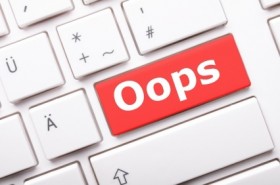Sadly an email sent is rarely if ever deleted. There is always someone somewhere who will have kept a copy and produce it just when you least expected.
Yes, in Outlook you can recall an email. However as soon as one sees that recall message I defy anyone not to be tempted to open the offending email!
Here are a few recent email scandals where the sender is probably bitterly regretting they ever sent the original email.

Email regrets
There is nothing new about emails you wish you had never sent. It is that somehow we never seem to learn good email etiquette and that email sent, is an email kept for life. Within everyday business you can take three easy steps to reduce the risk of creating an email scandal.
1. Resist hitting Reply All – check who is in the To and CC address box and make sure you are sending it to the right people.
2. Think and re-read your email before hitting send. Ask yourself what if this turned up on the wrong person’s desk?
3. Practice the art of ‘slow email’. Write a rule to put every email into a holding pattern before it leaves your inbox.
For more suggestions see Mesmo Consultancy video on how the manage the risks of cyber crime and leaking confidential information.
How do you have a preferred way to manage these risks to ensure you have no regrets about the emails you send?
Tags: email etiquette, email scandals, Mesmo Consultancy, Recall email, Slow email
Despite all the email scandals why do we persist in in writing emails which can cost us our job (eg discussing our sex lives and making derogatory remarks about colleagues)? Click here to read full article from The Telegraph 17 April 2015
Tags: email scandals
Email disaster happen time and time again. Over fifteen years of writing two books on email best practice and many articles, not surprisingly I have files full of email media disasters from the early stories of naughty Claire Swire emails to the more serious ones where Kirsty Walk asked her PA to hack into someone else’s inbox to retrieve some damaging emails.
When will we learn that no matter how hard we try to erase an email we wish we had never sent, someone will have a copy. Furthermore as we become increasingly litigiousness many organisation now archive all email traffic in and out of their servers. Two press stories prompted me to write again on this topic. First, there is the phone hacking trial in which copious evidence is email related. At one point the management team tried to destroy all old emails only to find not surprisingly that they had been archived by their mail provider.
organisation now archive all email traffic in and out of their servers. Two press stories prompted me to write again on this topic. First, there is the phone hacking trial in which copious evidence is email related. At one point the management team tried to destroy all old emails only to find not surprisingly that they had been archived by their mail provider.
Second, was the recent email trail between Ed Miliband and a senior aide which branded Ed Balls as a ‘nightmare’. This was a classic case of not only putting something stupid into an email but then compounding the felony by sending it to the wrong person!
What can we do to avoid such email scandals which seem to now occur regularly? Recall the email. No that doesn’t work as I now have it and am intrigued why you are recalling it.
Here are my top three tips:
Most people feel compelled to either reply instantly they receive a new email or fire off an email when feeling cross. This usually results in unnecessary emails chains which often spiral into email wars and drive up the email overload. There is a time and place for chatting and gossip but email is not that place.
Do you want to reduce the risk that someone in your organisation will make an email faux pass? Call us now and ask about how our Brilliant Email Management masterclass can help you and your organisation prevent such email disasters (which are often very expensive in terms of damage limitation PR and putting people on gardening leave).
Meanwhile, dare to share, what are your tips for avoiding an email disaster? Have you ever been subject such an email scandal?
Tags: email disasters, email management training, email overload, email scandals